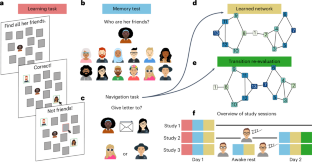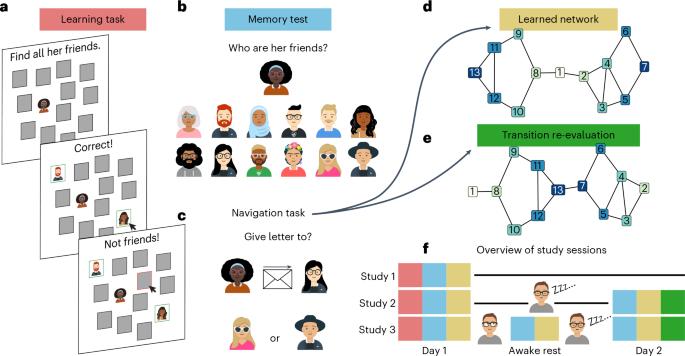Replay shapes abstract cognitive maps for efficient social navigation
IF 21.4
1区 心理学
Q1 MULTIDISCIPLINARY SCIENCES
引用次数: 0
Abstract
To make adaptive social decisions, people must anticipate how information flows through their social network. While this requires knowledge of how people are connected, networks are too large to have first-hand experience with every possible route between individuals. How, then, are people able to accurately track information flow through social networks? Here we find that people immediately cache abstract knowledge about social network structure as they learn who is friends with whom, which enables the identification of efficient routes between remotely connected individuals. These cognitive maps of social networks, which are built while learning, are then reshaped through overnight rest. During these extended periods of rest, a replay-like mechanism helps to make these maps increasingly abstract, which privileges improvements in social navigation accuracy for the longest communication paths that span distinct communities within the network. Together, these findings provide mechanistic insight into the sophisticated mental representations humans use for social navigation. How do people track information flow through social networks? New research finds that extended periods of rest, such as sleep, help people build abstract cognitive maps that identify efficient routes between remotely connected network members.


重放塑造抽象认知图谱,实现高效社交导航
为了做出适应性的社交决策,人们必须预测信息如何在社交网络中流动。虽然这需要了解人们是如何联系在一起的,但网络太大,人们不可能对个人之间的每条可能路线都有第一手经验。那么,人们是如何准确追踪社交网络中的信息流的呢?在这里,我们发现人们在得知谁是谁的朋友时,会立即缓存有关社交网络结构的抽象知识,从而识别出远程连接的个体之间的有效路径。这些在学习过程中建立起来的社交网络认知图谱,会在通宵休息时被重塑。在这些长时间的休息过程中,一种类似于重放的机制会帮助这些地图变得越来越抽象,从而使跨越网络内不同社区的最长通信路径的社交导航准确性得到提高。总之,这些发现从机制上揭示了人类用于社会导航的复杂心理表征。
本文章由计算机程序翻译,如有差异,请以英文原文为准。
求助全文
约1分钟内获得全文
求助全文
来源期刊

Nature Human Behaviour
Psychology-Social Psychology
CiteScore
36.80
自引率
1.00%
发文量
227
期刊介绍:
Nature Human Behaviour is a journal that focuses on publishing research of outstanding significance into any aspect of human behavior.The research can cover various areas such as psychological, biological, and social bases of human behavior.It also includes the study of origins, development, and disorders related to human behavior.The primary aim of the journal is to increase the visibility of research in the field and enhance its societal reach and impact.
 求助内容:
求助内容: 应助结果提醒方式:
应助结果提醒方式:


